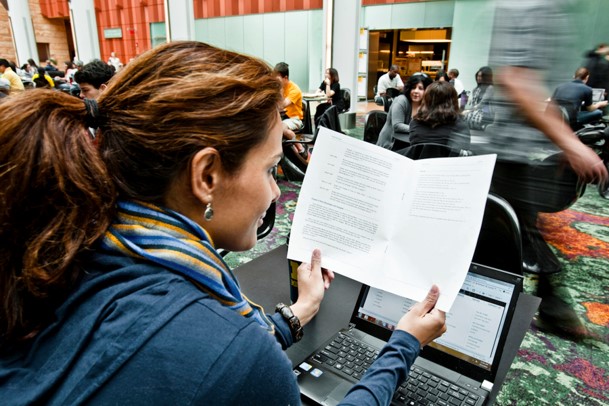
WDI Publishing is organizing a new competition for case studies focusing on the unique advantages and challenges of doing business in the Middle East and North Africa (MENA) region.
Submissions for the competition, “Doing Business in the Middle East, North Africa Region,” should focus on a business dilemma of an organization or company located or doing business in the MENA region. The cases may feature a small or large organization, private sector multinational, non-governmental organization (NGO) or nonprofit.
The global competition is open to individual students or student teams, as long as they enter in collaboration with a faculty member from a degree-granting university or college. Faculty or faculty teams may also enter as long as they are currently teaching at a degree-granting university or college. Other individuals may also enter, provided they do so in collaboration with a faculty member from a degree-granting university or college.
The winning entry will be awarded $5,000. Second place will earn $3,500 and third place $1,500. Additionally, all three winning cases will be published by WDI Publishing and added to its case catalogue. Entry forms are due Dec. 12, 2019, and the final case and teaching note must be turned in by Feb. 9, 2020. Winners will be announced on March 20, 2020.

To learn more about key deadlines, entry requirements, judging criteria and to access entry forms and submission documents, click here. For resources on how to write a case study and a teaching note, along with other helpful information, click here.
WDI Publishing has assembled an impressive panel of judges for the competition. They are:
Kim Bettcher – Center for International Private Enterprise (CIPE)
Andrew J. Hoffman – University of Michigan Ross School of Business
Manel Khadraoui – University of Tunis/Tunis Business School
Hagop Panossian – American University of Beirut Olayan School of Business
WDI Publishing Manager Sandy Draheim said she hopes the competition will encourage the development of new, academic case studies about the MENA region, increase the understanding of doing business there and grow the critical thinking skills of university students in these countries through the use of these new MENA-focused cases.
“There are many regions of the world that could use more ‘localized’ business case studies for higher education,” Draheim said. “But, partly based on the incredible response, interest and results of WDI’s M²GATE program, we thought it would be interesting to target our first geographically-themed case competition around MENA issues. We want to elevate the quality and quantity of teaching materials that provide students – both in the MENA region and around the world – with opportunities to take on the roles and responsibilities of managers in organizations located or doing business in this region.”
The Vital Voices GROW Fellowship invests in women business owners in emerging economies over a yearlong fellowship. Here, four business owners talk with Nathan Rauh-Bieri about how, in the final stage of the fellowship, they implemented and revised their action plans and evaluated progress toward their growth goals.
As part of his continuing series, Nathan Rauh-Bieri checks back in with participants in the year-long Vital Voices GROW Fellowship. In a world growing more “virtual” by the day, he learned there’s still plenty of value in entrepreneurs meeting face to face.
Vittana is a Seattle-based nonprofit that facilitates microloans to students in developing countries. Vittana aims to help students worldwide attend post-secondary schools. Donors offer to pay for students’ tuition by lending them small amounts — typically $25-50. Student repayment rate is 99 percent. Student intern Nour Shammout evaluated the successes and challenges of Vittana’s current student load products to determine the appropriate strategic approach for modifying existing loan products and scaling student microloan programs in Jordan.
The Kingdom of Jordan is a developing economy and acts as a stable safe haven for many refugees in the surrounding area undergoing civil conflict. With an influx of refugees from neighboring countries and a high birthrate, Jordan’s population is growing rapidly. A western friendly country, Jordan has been working with organizations such as the World Bank and USAID for many years to develop its infrastructure, rule of law, and economy. As in many other countries, Jordan has a gap in lending to businesses between the Micro level and the corporate level. The Central Bank of Jordan (CBJ) is keen on finding formal banking solutions to address this gap and extend more credit to small and medium enterprises (SMEs). The primary issue preventing an expansion of credit to SMEs is a lack of risk mitigation.
The student MAP team develoed a report that analyzed four different products focused on reducing risk for banks, borrowers, and investors. The goal of this project was to evaluate the economic feasibility of increasing lending to Jordanian MSMEs and to develop a profitable financial instrument that increases the access to capital made available to MSMEs for the benefit of the Jordanian economy. The MAP team spent two weeks in Jordan interviewing representatives from all over the Jordanian financial sector.
The United Nations Development Programme’s (UNDP’s) Istanbul International Center for Private Sector in Development (IICPSD) builds on Turkey’s convening power and dynamic private sector, as well as UNDP’s global mandate, to engage the private sector constructively in supporting global and local efforts to address development challenges. IICPSD, UNDP Jordan and its partners worked on conducting a market study to prepare a business case for the use of geothermal energy in Jordan to dry fruits and vegetables. This is a crucial initiative for Jordan’s ability to provide stability and growth opportunities to both the local communities and the refugees from neighboring countries undergoing conflict. Through this project, the government of Jordan will have a better understanding on the business linkages that can be established in the local and international markets and its export potentials.
WDI partnered with Al Quds College (AQC) in Amman Jordan and Washtenaw Community College (WCC) in Michigan to implement strategies for developing an entrepreneurial mindset among Jordanian community college students, and establish a business incubator at AQC to support and assist students in launching successful businesses. The team sought to develop an educational approach that integrated the vocational and technical skills that students pursue at AQC, with business skills, practical experience, and access to a support network so they will understand how to establish, operate, and grow small businesses. A USAID project managed by Higher Education for Development.
WDI partnered with Washtenaw Community College in Michigan and Al Quds College in Amman, Jordan to develop an entrepreneurial mindset among the students at Al Quds by infusing entrepreneurial concepts, business skills and practical experience into the vocational and technical coursework pursued by students. A business incubator was created and identified as a priority by both AQC leadership and the students.
Bilal Salman was heading into his senior year at Al Quds College in Amman, Jordan when he learned about a new entrepreneurship program at the school.

He said he liked the idea of a program to “help students create jobs instead of getting jobs.”
The Community College Entrepreneurship: Integration to Incubation Project – known locally as Lumina Zone Entrepreneurship Project – was jointly designed and developed by WDI and Washtenaw Community College (WCC) in Ann Arbor, Michigan. It is funded by the Higher Education for Development (HED) through the U.S. Agency for International Development.
During his senior, Salman – an interior design major – participated in as many entrepreneurship activities as he could. He attended lectures by local entrepreneurs, joined the student entrepreneur club, took classes in entrepreneurship and, eventually, became one of the first student tenants of the Quds Business Incubator for Entrepreneurs.
WDI, WCC and Al Quds launched the incubator in Amman in late 2013 so budding entrepreneurs at Al Quds could take their ideas from the classroom to grow full-fledged businesses. Salman, along with five other students, joined the incubator for six months to continue developing their entrepreneurial skills. For Salman, the entrepreneurial training gave him legitimacy with his peers, family, and customers, and ignited other ideas for businesses outside of his major.
He developed a business plan for a year-round food court concept with healthy food packaged in an aesthetically pleasing way. His idea gained a lot of attention in the local community, including from funders. Salman decided that he didn’t want a donation.
Instead, he is dedicated to working in the design field so that he can raise the money necessary to start the food court business.
“This business, it’s my baby. I want to have the freedom to make decisions and use my imagination to make it the best,” he said.
Since his 2013 graduation, Salman has worked abroad and plans to return to Jordan and start his food court business.
Salman’s colleagues are sure he will continue to have more entrepreneurial ideas and that he will put those ideas into action.
Quds Business Incubator Manager Sara Al-Jabsheh said, “Bilal is a perfect example of the lifelong changes in attitude this program encourages in students.”
Salman started college at AQC because he thought it would help him secure a job. Now he is traveling and working for himself with the ultimate goal of starting a business, thanks to the WDI entrepreneurship program.